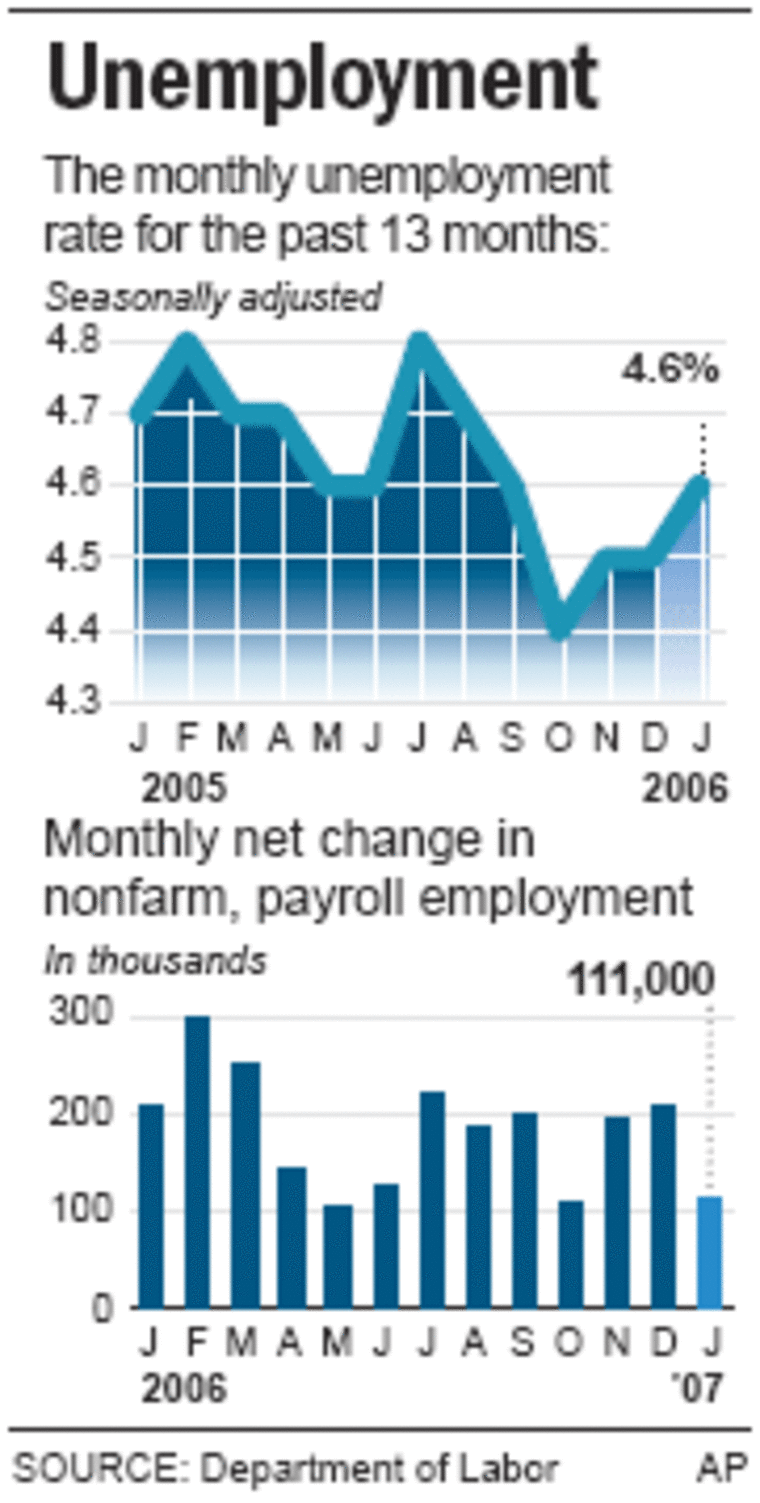The nation’s unemployment rate climbed to a four-month high of 4.6 percent as somewhat wary employers added fewer new jobs in January. Wage gains were more modest.
The newest report on the economy, released Friday by the Labor Department, suggested that the jobs market got off to a slower start in 2007 yet still remains in decent shape. The more subdued job growth — 111,000 positions — is consistent with the expectation that growth in the economy as a whole will moderate this year.
The tally of new jobs added last month fell short of economists expectations for a gain of around 150,000 positions. Analysts also had said they anticipated that the overall unemployment rate would have held steady at 4.5 percent, the rate that was registered in December.
“Employers have adopted somewhat of a more cautious approach to hiring as they wonder how much of a slowdown there will be,” said Ken Mayland, president of ClearView Economics. Analysts predict the economy will lose some speed in the January-to-March period following an energetic October-to-December quarter.
January’s unemployment rate was the highest since a 4.6 percent rate registered in September. Even with the bump-up, though, the seasonally adjusted civilian employment is low by historical standards. During the depths of a recession in the early 1980s, for example, the unemployment rate hit double-digit levels.

The payroll gain of 111,000 came after 206,000 jobs were created in December, a figure that was stronger than reported a month ago. October and November payroll gains also turned out to bigger, helping to take some of the sting out of January’s performance.
The report comes as President Bush, in economic speeches this week, has sought to soothe some workers’ anxieties about their ability to keep or find a job in a dynamic economy that puts an increasing emphasis on skills, education and flexibility. Democrats, now in control of Congress, pledge to help the middle class, a group, they contend the White House has ignored. Getting final agreement in Congress on legislation boosting the federal minimum wage from $5.15 to $7.25 an hour is a top priority.
The report out Friday also showed that workers saw slower wage growth in January. Average hourly earnings rose to $17.09, a 0.2 percent increase from the prior month and half the pace seen in December. Analysts were expecting a larger 0.3 percent rise. Over the 12 months ending in January, wages grew by 4 percent.
Wage growth should help keep consumers spending, a contributor to overall economic health. With inflation ebbing, people will have more money left over from their paychecks to spend on other things.
The Federal Reserve, citing an improvement in some inflation readings, decided to hold a key interest rate steady on Wednesday. Many economists think rates could stay where they are for most of this year.
Separately the Commerce Department reported that new orders placed with U.S. factories rose by 2.4 percent in December, the most in nine months. For all of last year, factory orders rose by 5.3 percent. That was down from 8.1 percent in 2005 and was the smallest increase since a 0.9 percent rise in 2003.
In the employment report, much of the weakness in January’s payrolls stemmed from job losses in the manufacturing sector. Factories sliced 16,000 jobs, marking the seventh straight month of job cuts. Last month, manufacturing job losses included positions in the struggling automotive sector, as well as at factories making computers and electronics, furniture and textiles.
The construction sector, meanwhile, added 22,000 jobs in January helped by warm weather. This sector has experienced painful job cuts related to the housing slump.
Retailers, education and health services, professional and business services, financial firms, leisure and hospitality, and the government were among those posted jobs gains last month.
At the same time, the job hunt grew longer.
The average time that the 7 million unemployed people spent in their job searches was 16.2 weeks in January, up from 15.9 in December.
Meanwhile, annual revisions to the payroll figures, based on more complete information, showed that the economy added an extra 754,000 jobs for the year that ended March 2006, one of the biggest revisions in recent years.
Monthly payroll growth also turned out to be stronger last year, with an average of 187,000 jobs being created per month, versus the 153,000 a month previously thought.
The economy grew by 3.4 percent in 2006, a two-year high. That performance was impressive, given the ill effects of the housing slump and the troubled auto sector.
Economists predict that economic growth will be slower this year, which should push up the unemployment rate to 4.9 percent from last year’s 4.6 percent, a six-year low.